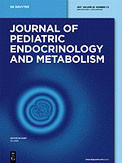Koloušková S, Zemková D, Bartošová J, Skalická V, Šumník Z, Vávrová V, Lebl J. J Pediatr Endocrinol Metab. 2011; 24(7–8):449–54. IF: 0.887

Department of Paediatrics
Abstract
Cystic fibrosis related diabetes (CFRD) is an insulinopenic condition. We aimed to detect insulinopenia early and to evaluate the impact of low dose insulin on nutritional status and forced expiratory volume in first second (FEV1). Out of 142 cystic fibrosis patients (CFpts) older than 10 years, 28 with abnormal oral glucose tolerance test in spite of normal fasting glycemia were found to have decreased first phase insulin release and started low dose insulin therapy (median age 15.4 years). Sex and age matched CFpts with normal glucose tolerance (NGT) were observed for comparison. Whereas nutritional status improved following 3 years of insulin administration, FEV1 stabilized in insulin-treated insulinopenic subjects (73.8 ± 4.3% vs. 73.5 ± 4.4%), but decreased in the parallel group with NGT who remained without insulin treatment (71.1 ± 3.8% vs. 61.0 ± 4.0%; p = 0.001). We conclude that low dose insulin improves nutritional status and stabilizes pulmonary functions. Regular estimation of stimulated insulin secretion in CFpts may allow optimizing treatment.
-mk-
